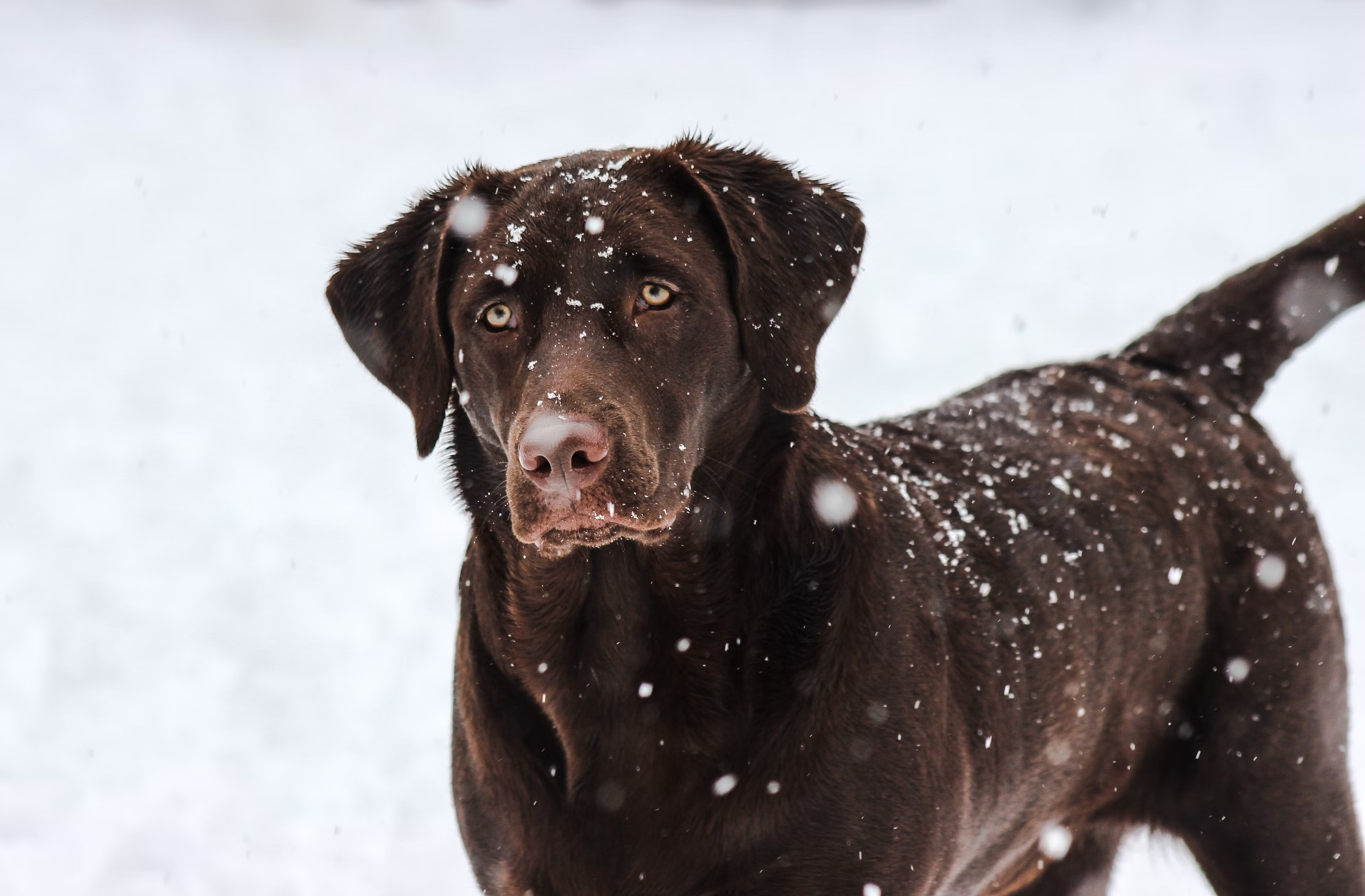Do Labradors Get Separation Anxiety: Complete Guide

Labrador Retrievers are among the most favourite dog breeds in the world. They are known for their friendly nature, high intelligence, and loyalty. This breed is highly cherished by families because of its affectionate nature and compatibility with children, but on the same side Labradors are highly prone to separation anxiety in dogs
However, like most other dog breeds, Labradors can also be prone to behavioural problems, such as separation anxiety.
Separation anxiety is marked by puppies and sometimes older dogs who become anxious and distressed when left alone for extended periods of time. Labradors, being very social dogs, are likely to have a higher incidence of suffering from separation anxiety.
In this article, we shall discuss Whether Labradors Get Separation Anxiety, what to look out for, and what you can do to make your Labrador feel safe and secure when you are not around. We will also discuss other interesting topics, such as whether Labradors get jealous, their boldness, and why they become jealous under certain conditions.
Check out Labrador Retriever Dog Breed: Complete Guide to get a better understanding of your Dog.
If you are looking to get a dog which has less Separation Anxiety check out Are German Shepherds good as Guard Dogs?
Understanding Labrador Separation Anxiety
That’s really pretty deep, especially for social dogs like Labradors, who need lots of company.
Whether it is a puppy Labrador Retriever, a white Labrador Retriever, or a brown one, they all have one thing in common: an intense need to interact with people. Those dogs are happiest around their masters, which sometimes leads to the anxiety caused by isolation.
Separation anxiety is dominant in all the Labrador types. It is most marked in the young puppies who have not yet learned how to deal with loneliness.
Labradors who experience separation anxiety tend to differ in their reactions. These include:
1. Excessive Barking or Howling: Labradors who are left alone for a long time bark, howl, or whimper. This is an indication of distress because it shows that they feel the need for their owners.
2. Destruction of house property: Separation anxiety might lead Labradors to chew furniture, shoes, and other home appliances in their presence. The damage is probably owed to stress and a desire for something on which to focus their anxiety nerves.
3. Urinating or defecating indoors: Even though your Labrador Retriever puppy is trained to dislike indoor urination and defecation, such incidents may continue in your absence. The most probable explanation for these incidents is the anxiety that comes with separation.
4. Pacing or restlessness: Dogs with separation anxiety may pace back and forth or become extremely restless when left alone.
Why Do Labradors Experience Separation Anxiety?
Labradors are, by nature, social dogs and are more susceptible to suffering from separation anxiety than other breeds that are independent by nature. These are some of the main reasons why a Labrador Retriever puppy or adult dog could suffer this condition:
• Attachment to owners: Any bond between the Labrador and its owners develops quite easily. They cannot stand even a short period of separation from the owners.
• Routine changes: Changes in routine schedules in homes, such as a job that takes the owner away for more extended hours, result in separation anxiety for Labradors.
• Early experiences: Repeated early separation from mother or littermates can drive a Labrador Retriever puppy into the life experience,, which later manifests as separation anxiety.
How to Help Labradors Cope with Separation Anxiety
Fortunately, there are several methods you can use to help support your Labrador in dealing with separation anxiety. From a brown Labrador Retriever to a white Labrador Retriever, the tips below can be extremely useful for helping each different type of Labrador Retriever.
1. Safe space: Ensure you provide a comfortable and safe space in your home that your Labrador can stay in whenever you are away. The space should have their bed, toys, and some items with familiar scents to calm them.
2. Short separation exercise: It is crucial to sometimes leave your dog alone for short periods. Gradually increase the time you go out. This will enable your dog to adapt to being left alone rather than feeling unwell.
3. Keep your mind in action: Labradors are very smart and need some sort of physical but mentally stimulating stimulation. Puzzle toys and treat-dispensing toys work well if you go out of the house for some time.
4. Stay calm during departures and arrivals: This is where most people go wrong, especially if your Labrador loves you so much. Avoid making a lot of commotion if you go out of the house or arrive back. Making these moments calm will help your Labrador understand that staying alone does not mean anything bad.
5. Exercise before leaving: Make sure the Labrador gets enough exercise before you leave the house. A tired dog will not be anxious or destructive.
Do Labradors Get Jealous?
Yes, Labradors can be jealous. Like any other dog, Labradors are sensitive animals that feel emotions nearly comparable to jealousy because of the attention paid elsewhere to their owner.
Whether it’s a new pet in the house, a baby, or even another family member, a Labrador Retriever puppy or an adult Labrador might show symptoms of jealousy if it feels neglected.
Signs that your Labrador is jealous include:
1. Attempting to push between you and the object of jealousy: Labradors can attempt to create a physical barrier between you and whatever they think is competition.
2. Attention-seeking behaviours: An attentive Labrador can whine, nudge you, or react in multiple other ways to get attention back.
3. Aggression or possessiveness: While Labradors, as a breed, are not aggressive animals, a jealous dog will be more possessive of toys, food, and even its owner.
Why Labradors Get Jealous?

There can be any number of reasons why a white Labrador Retriever or brown Labrador Retriever gets jealous. Knowing the reason enables you to look at and rectify the issue, and the dog will feel much better secure in its owner’s care.
1. Attention: Dogs, especially labradors, need lots of attention from their owners. They get jealous if they feel that someone else, other than their owner, has taken their position.
2. Changes in routine—As most dogs do, labradors have an affection for doing something and repeating it as a routine. A change can be something like bringing a new pet or a new baby into the house, which makes the dog anxious and shy.
3. Bond with the owners: Labradors are attached to their owners. If they feel that their bond is under threat, they can react with jealous behaviour.
Dealing with jealous Labradors: Give more time and attention so that the dog may feel loved. Gradually introduce elements like a new pet at home.
Are Labradors Brave?
Labradors are confident and friendly dogs; however, that does not mean they are never afraid. A Labrador is a fearless dog that will often protect its family yet still gets frightened or anxious in situations, especially negative ones, if it has experienced them.
Labrador fearfulness: Mainly based on factors
• Socialization: A properly socialised Labrador Retriever puppy will often grow into a much more confident and less fearful adult dog. Moreover, exposure to many settings, people, and other animals may help the dog feel safer.
• Personality: Like humans, each type of Labrador Retriever has its own personality. Some Labradors are naturally more cautious or timid, while others may be bold and adventurous.
• Past experiences: A brown Labrador Retriever or white Labrador Retriever who has gone through traumatic or unpleasant experiences can be more fearful than other dogs while coming across strange noises or places.
Labradors, though, are not generally known to be fearful. Their inbred confidence, together with their friendly nature, makes them one of the best family dogs. With proper care and guidance, any fears they may have can be handled or overcome.
How to Keep Your Labrador Happy and Secure
This, no matter what problem you want to solve—separation anxiety, jealousy, or a generally fearful attitude—ensures that your Labrador Retriever puppy or adult feels happy and safe.
Here are some general tips that will be helpful for any type of Labrador Retriever- white Labrador Retriever or brown Labrador Retriever –
1. Sufficient exercises: Labradors are very energetic dogs that require strenuous work to keep fit and healthy. Daily walks, playing time, and mental stimulation must be observed.
2. Routine: Pets, especially Labradors, are creatures of habit. They enjoy sticking to routine schedules of feeding, walks, and playtime, which has been known to reduce anxiety and behavioral disorders.
3. Socialization: You should expose your Labrador Retriever puppy to different experiences early enough so that they can grow into well-balanced adults. This includes socialisation with new people, various animals, and environments.
4. Positive reinforcement: Labradors are known to thrive under positive reinforcement. Rewarding good behaviour with good reputation, treats, or affection will encourage them to continue doing so.
5. Quality time: Labradors love quality time with their family; thus, spend some excellent time with your dog on each day of the week. It might be just playing fetch or sitting together; your Labrador will appreciate such a moment and time.
Conclusion
In conclusion, a Labrador also suffers from separation anxiety, jealousy, and fear, but these can be controlled with proper care, training, and attention.
Each type of Labrador Retriever, be it white, brown, or other varieties, is different; however, they all require love, friendship, and mental stimulation. If you understand your Labrador’s needs, you can very well ensure that it lives a happy and balanced life.
Read more
-
Maltipoo Dog Breed Guide: Temperament, Care, Size. Complete Guide
If you are looking for a friendly, loving, and adorable companion, then you can choose
-
Is Honey Safe for Dogs? Benefits, Risks Feeding Tips
Society has used honey for human medicine and its use as a natural sweetener for
-
How to Travel with a Labrador Retriever: A Comprehensive Guide
Have you ever held yourself back from taking your Labrador Retriever on a trip, wondering
-
Can Labrador Retrievers Swim? Water Safety & Training: Complete Guide
Labrador Retrievers are one of the most beloved dog breeds globally, celebrated for their friendly
-
Difference Between a Labrador and a Golden Retriever? Which one to Choose: Complete Guide
When it comes to the selection of the better dog breed, both Labrador Retrievers puppy
-
How to Help a Labrador Lose Weight: Complete Guide
Labradors are known for their friendly demeanor, loyalty, and love for food. While these traits
-
Introduce a Labrador to a New Pet: Easy Dog Training Complete Guide
Labradors are one of the most loving and friendly dog breeds. They are known for
-
How to Help a Labrador Lose Weight: Complete Guide
Labradors are known for their friendly demeanor, loyalty, and love for food. While these traits
-
How to Stop a Labrador from Jumping on Owner: A Complete Guide
The Labrador Retriever is arguably one of the favourite dog species globally, strongly associated with
-
The Best Dog Toy for Labrador Retrievers: A Complete Guide
Amongst all breeds of dogs, Labradors are among the most loved around the world, particularly
-
Are Labs Good Apartment Dogs: Benefits and problems: Complete Guide
Labrador Retrievers are one of the most popular dog breeds in the world today. Known

